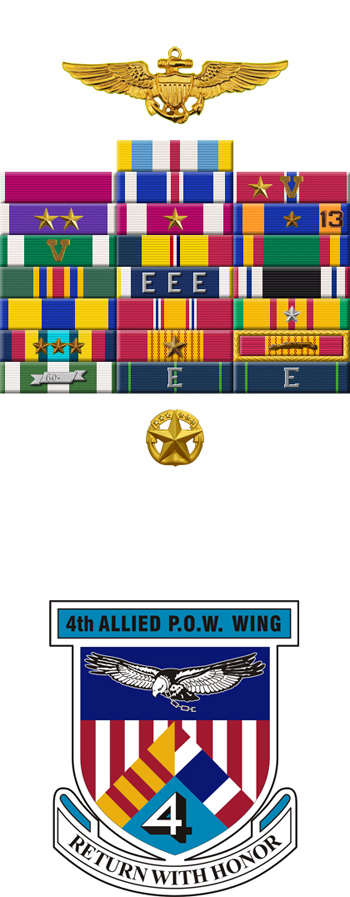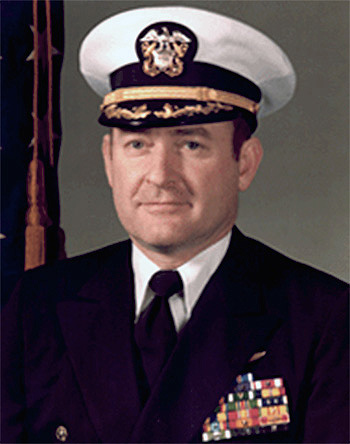
|
David W. Hoffman |
 |
|||
| Rank, Service | ||||
Captain O-6, U.S. Navy |
||||
| Veteran of: | ||||
|
||||
| Tribute: | ||||
Dave Hoffman was born in 1941 in Philadelphia, Pennsylvania. He entered the U.S. Naval Academy in June 1958, and graduated with a commission as an Ensign in the U.S. Navy on June 6, 1962. Ens Hoffman next completed flight training and was designated a Naval Aviator in December 1963, followed by service as a flight instructor with VT-2 at NAS Whiting Field, Florida, from January to December 1964. He then attended F-4 Phantom II Replacement Air Group training with VF-121 at NAS Miramar, California, from January to July 1965, followed by service as an F-4 pilot with VF-96, deploying to Vietnam aboard the aircraft carrier USS Enterprise (CVN-65) from October 1966 to April 1967. His next assignment was as a tactics instructor with VF-121 at NAS Miramar from July 1967 to January 1969, followed by U.S. Naval Postgraduate School at Monterey, California, to complete his Master's degree in Operations Research from January 1969 to April 1971. LCDR Hoffman then returned to VF-121 for Replacement Air Group training before serving as the Landing Signal Officer on the staff of CVW-15 aboard the aircraft carrier USS Coral Sea (CVA-43) from May 1971 until he was forced to eject over North Vietnam and was taken as a Prisoner of War on December 30, 1971. After spending 455 days in captivity, he was released during Operation Homecoming on March 28, 1973. CDR Hoffman was briefly hospitalized to recover from his injuries at the Naval Hospital in San Diego, California, and then served as a flight instructor with VF-121 from July to November 1973. His next assignment was as an F-4 and F-14 Tomcat pilot, and as Operations Officer, Maintenance Officer, and then Executive Officer with VF-142 at NAS Miramar and then at NAS Oceana, Virginia, from November 1973 to February 1976, followed by service as Readiness Officer with Commander Fighter Wing ONE at NAS Oceana from February 1976 to April 1977. CDR Hoffman served as Executive Officer of VF-33 at NAS Oceana from April to December 1977, and then as Executive Officer and Commanding Officer of VF-41 at NAS Oceana from January 1978 to June 1979. His next assignment was on the staff of the Chief of Naval Operations in the Pentagon from July 1979 to January 1981, followed by CAG training from February to September 1981. Capt Hoffman then served as Commander Carrier Air Wing 8 (CVW-8) at NAS Oceana and aboard the aircraft carriers USS Carl Vinson (CVN-70) and USS Nimitz (CVN-68) from September 1981 to December 1982. After attending Prospective Commanding Officer School, he served as Commanding Officer of the amphibious assault ship USS New Orleans (LPH-11) from August 1983 to April 1985, followed by service as Chief of Staff to the Commander, Cruiser Destroyer Group 5 (CCDG-5) from April 1985 to January 1986. Capt Hoffman next served as Commanding Officer of the aircraft carrier USS Kitty Hawk (CV-63) from February 1986 to February 1987, and then on the staff of Headquarters U.S. Pacific Command at Camp H.M. Smith, Hawaii, from February 1987 until his retirement from the Navy on July 1, 1988. |
||||
|
||||

